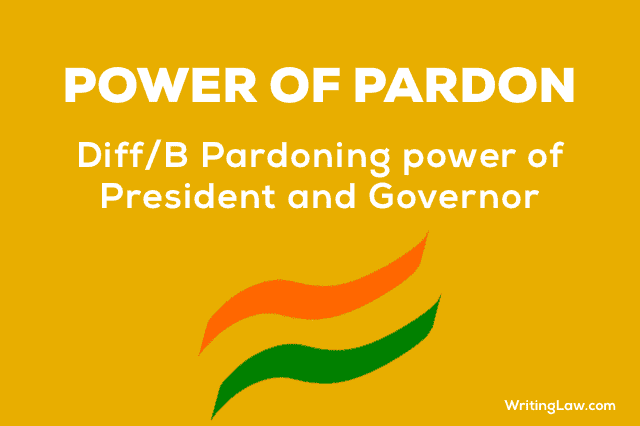
Pardon means to forgive a person for the offence he has done. Under the Indian Constitution, the power to grant pardon has been conferred on the President of India under Article 72 and the Governor of states under Article 161. The object behind pardoning power is to correct possible judicial errors and miscarriage of justice. It is a way to prevent the innocent from punishment.
Power of Pardon by the President of India
Under Article 72, the mercy petition is filed to the President, and his powers are as follows:-
1. Pardon: The President can totally absolve/acquit the person for the offence and let him go free like an ordinary citizen.
2. Commutement: To reduce the type of punishment into a less harsh one. For example, rigorous imprisonment to simple imprisonment.
3. Remission: To reduce the punishment without changing the nature of the punishment. For example, 20 years of rigorous imprisonment to 10 years of rigorous imprisonment.
4. Reprieve: A delay is allowed in the execution of a sentence, usually a death sentence, for a guilty person to prove his innocence.
5. Respite: Reduce the degree of punishment by looking at specific grounds like pregnancy, etc.
Note: The President can exercise the judicial powers at any stage, which means before, during, or after the trial.
Difference Between the Pardoning Power of President and Governor
1. President can pardon the death sentence, but the Governor has no power to pardon the death sentence.
2. The President can pardon in case of Court Martial. But the Governor cannot pardon in a Court Martial.
3. The President exercises his judicial powers for the punishment which is given under the law made by the union. Whereas the Governor uses his judicial powers for the punishment, which is provided under the law made by the state.
Is the Power to Pardon Given to the President Absolute, and Does This Power Come Under Judicial Review?
The pardoning powers of the President are wider than that of a Governor. The President can pardon, respite, reprieve, and remit even in death warrant and Court Martial. However, no power is absolute.
If the power is given absolutely, it may give rise to arbitrariness. Therefore the pardoning power of the President is subject to judicial review.
In the Epuru Sudhakar case, the Supreme Court ruled that to have a check on the pardoning power of the President; the judiciary can intervene to prevent him from doing arbitrary actions.
Read Next:
1. Pardoning Powers of the Governor With Latest Updates and Judgements
2. What Are the Discretionary Powers of the President of India
3. What Are the Differences in Pardoning Powers of the Indian President (Article 72) and the State Governors (Article 161)
- Article 334A of the Constitution of India - 14th April 2024
- Article 332A of the Constitution of India - 14th April 2024
- Article 330A of the Constitution of India - 14th April 2024








I’ve learned so much from your site. Thank you.
That is very kind of you. Thank you.
Good stuff for law students loved it…thanks a lot to author..
Need some judgment sample to me for studying
Glad you like it. Please see this for Judgement writing tips and two samples.
Best useful site fr law students i have ever seen ❤️
Pleased to read your thoughts about WritingLaw. Thank You.
It is a very helpful website and great…. Plz buy PDF on this website… Thank you.
Thank you for your kind words and shout-out. It means a lot to me.
Good article
Happy that you liked it.